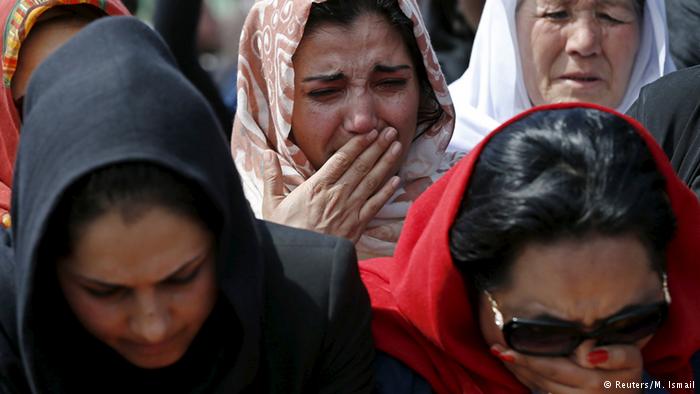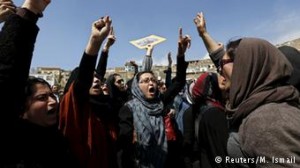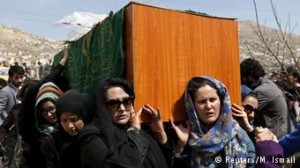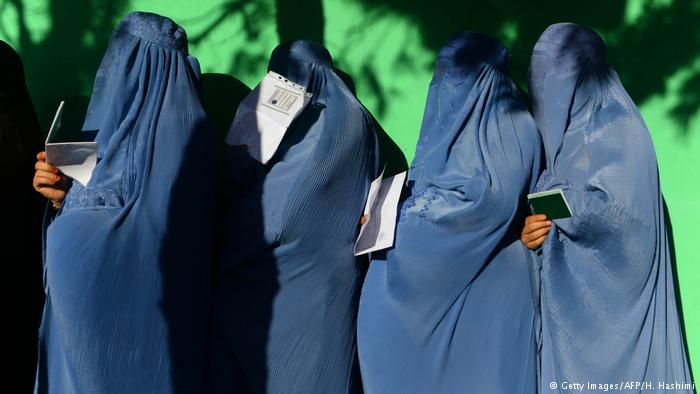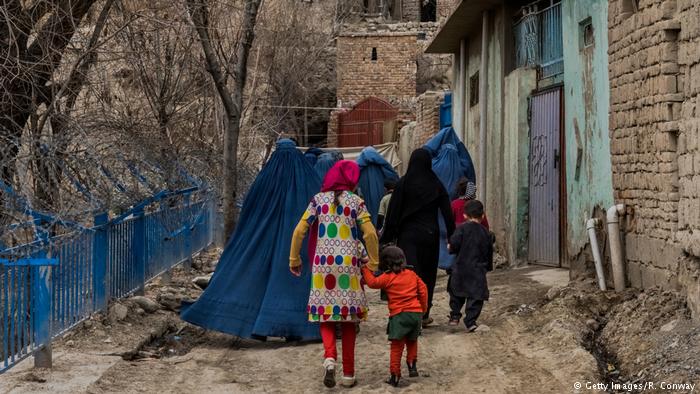How Afghan women are dissuaded from asserting their rights
Deeply engrained social norms along with allegations of corruption and lack of professionalism are hindering access to justice for Afghan women victims of violence, a new UN report finds. DW examines.
“I willingly decided to withdraw my complaint as it is better if I join my family. My children are currently studying at school. If my husband is prosecuted and imprisoned then who will be supporting me and my children?” These are the words of B., a 25-year-old woman from Afghanistan’s northeastern Takhar Province, talking to the United Nations about how she ultimately dealt with her complaint of battery and laceration against her husband.
Like B., few Afghan women victims of violence resort to state mechanisms to seek justice given that the existing legal framework and court adjudication process in the South Asian country provides “limited options,” a new UN report found.
Mediation vs. prosecution
Released by the UN Assistance Mission in Afghanistan (UNAMA) and the Office of the UN High Commissioner for Human Rights (OHCHR) on April 19, the paper states that only five percent of 110 surveyed cases involving violence were resolved through the judicial system, resulting in the criminal prosecution and punishment of perpetrators.
The majority of cases cited in the paper – mainly cases of battery and laceration and of abuse, humiliation and intimidation – were brought to mediation, a process to resolve a dispute through mutual agreement and reconciliation between parties. Analysts argue that while gains in women’s rights in Afghanistan have been remarkable since the fall of the Taliban in 2002, these rights remain limited by a host of elements which hinder not only access to justice, but also the chance of obtaining redress.
Abuse of power
According to UNAMA, women’s preference for mediation is influenced by several factors, such as perceived deficiencies in the criminal justice system, including allegations of corruption, abuse of power and lack of professionalism, as well as cultural and family pressure. Interviewed women were also cited in the report as stressing the value of mediation as a swift means to have their case processed – mainly due to their multiple obligations from assigned gender roles and financial constraints.
“I am going back to him because I have no alternative. If I had money and someone at home to take care of my children, I would never withdraw my complaint. I wanted to see him punished,” 35-year-old R. from Afghanistan’s northern province of Jawzjan was quoted as saying.
But why? Analysts view the Afghan women’s economic dependency and the weak legal protection of their property and other rights as key factors impeding survivors of violence from taking action against abusers. For example, a woman who complains to the authorities about violence and is forced to leave the marital home that is her husband’s property often has nowhere to go.
This is why the UN found that the majority of women surveyed were largely concerned with obtaining redress of a civil nature, such as divorce, custody settlements or living in a safe environment rather than seeking criminal sanctions, fearing the negative economic and social consequences they might generate for them and their families.
Social stigma, limited opportunities
A 2014 paper by the United States Institute of Peace (USIP) had pointed out that reporting abuses triggers social stigmatization. “In some Afghan communities, social taboos against external intervention limit both men and women from seeking state or NGO help,” said Erica Gaston, one of the authors of the USIP report.
“Women predominantly address their justice needs within their families or communities, but even there, a number of normative, consequential, and practical barriers prevent women from seeking or receiving justice,” said Gaston.
Understanding how these barriers affect women’s decision-making is critical to expanding access to justice. “Decisions that appear ill-advised because they forfeit rights are often based on a rational appraisal of the limited opportunities for justice and the likely consequences of seeking it,” the analyst added.
But has mediation been effective? Mediation councils usually consist of elders and members of the affected families, who gather to find a solution based on traditional laws. But the UN report criticized that in the absence of any standardized approach and oversight mechanisms, mediation was being performed “by a variety of actors” using “diverse and arbitrary methodologies.
In at least six cases examined by the UN, the women complainants were excluded from the mediation sessions, and in at least 11 cases the decision to mediate rather than pursue criminal proceedings was imposed on the women. Moreover, in at least 13 decisions, perpetrators did not honor the agreement made during mediation. With the reoccurrence of violence, women decided to return to shelters, file complaints to the criminal justice system and/or file for divorce.
Monitoring needed
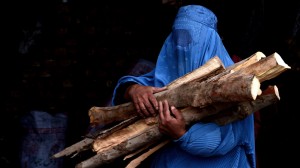
A burqa-clad Afghan woman carries chopped logs after buying them at a firewood yard in Herat. Photograph taken on February 23, 2015 (© AFP/Getty Images/A. Karimi)
Given this development, Ivan Šimonović, the UN Assistant Secretary-General for Human Rights, stressed that mediation “needs to be strengthened to make it more consistent and of a higher standard, and above all that its implementation should be closely monitored.”
The UN also urged the Afghan government to adopt legal, institutional and policy reforms to better protect Afghan women facing violence. These include expanding the civil remedies available, strengthening the capacity of the criminal justice system to protect survivors, regulating mediation through common standards, and applying the 2009 Law on the Elimination of Violence against Women or EVAW law.
“As demands for justice through mediation in Afghanistan increase, the government should ensure mediation practices fully protect the rights of victims,” said UNAMA chief Nicholas Haysom. However, he also reiterated that major crimes of violence against women must be prosecuted and adjudicated through the criminal justice process and not mediated, in accordance with Afghan laws and the country’s international human rights obligations.
Speaking on the situation of human rights – especially women’s rights – in Afghanistan, Sima Samar, head of the Afghanistan Independent Human Rights Commission, pointed to how very fragile the progress made over the past years has been. “The best example for this is the case of the martyr Farkhunda, the attack in Jalalabad and the kidnapping of 31 Afghans. All this proves that the rule of law is still very weak in Afghanistan. The people of Afghanistan are still very vulnerable.”
Author: Gabriel Domínguez
WTO RECOMMENDS
Afghanistan wants change
Afghan citizens want more empowerment and a say in how they will run their country. They are now eagerly waiting for the results of the presidential elections to emerge.
A journey through Afghanistan
Nazir Peroz wants to lead his country, Afghanistan, into the digital age. His areas of expertise are computer science and developing countries. Peroz heads the Center for International and Intercultural Communication, or ZiiK, at Berlin’s Technical University. Born in Kabul, he has been living in Germany since the late 1970s. His current mission is to revolutionize Afghanistan with German help.
Women at work: breaking social barriers in Afghanistan
Just until a few years ago, Zulfia did not have any option other than giving up her studies and staying at home in Kabul. Now, with the help of NAZO, a German organization she teaches young women to become independent.



